Tattoo Itching Like Crazy: [To Scratch Or Not To Scratch?]
One common symptom of a tattoo healing well is itching. You may experience some discomfort as your skin heals, since scabs and dry patches of skin may irritate and itch. Nevertheless, scratching can prevent the tattoo from healing and cause the ink to spread, leading to a muddled or misshapen final product.
So, when the tattoo itches like hell, scratch or not scratch?
The answer is, you should not scratch it. As the skin is trying to heal, scratching can disrupt the process and can cause infections or other issues. Instead of scratching, try moisturizing the area, applying a cold, wet cloth, or taking an over-the-counter antihistamine to relieve the itch.
Consult your tattoo artist or a medical expert for further advice if the itching is severe or continues for a lengthy period of time. Take special care of your tattoo while it’s healing to get the greatest possible results.
This article will discuss the causes of tattoo itching, the potential harm caused by scratching, and several alternatives for relieving discomfort and ensuring healthy healing. If you follow these steps, you should have a far better chance of successful tattoo healing and a long-lasting, beautiful result.
Why Your Tattoo Itches Like Crazy?
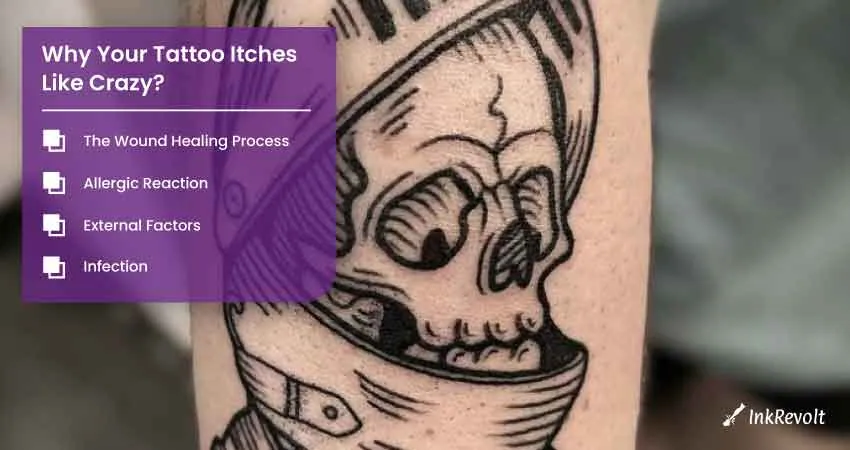
If you know what’s causing your tattoo to itch so much, you may take measures to reduce the itchiness and speed up the healing process. So, here you go with the reasons.
The Wound Healing Process
Needles used in tattooing puncture the skin, causing tiny holes that prompt the body’s repair mechanisms to close up and heal the tattoo. This procedure might lead to flaky skin, scabs, and irritation.
Allergic Reaction
Itching is a common reaction to tattoos because an allergic reaction can be triggered by the ink. If you have delicate skin or are allergic to certain types of ink, this may happen to you.
External Factors
Itching can be made worse by environmental variables including perspiration, restricted movement, and direct contact with heat or sunshine. The skin might grow dry and irritated from exposure to heat and sunshine, and tight clothes can irritate the tattoo directly.
Infection
Excessive scratching may be an indicator of infection in certain people. Redness, swelling, warmth, or leaking are all indicators of infection that require prompt medical care.
What Happens If You Scratch An Itchy Tattoo?
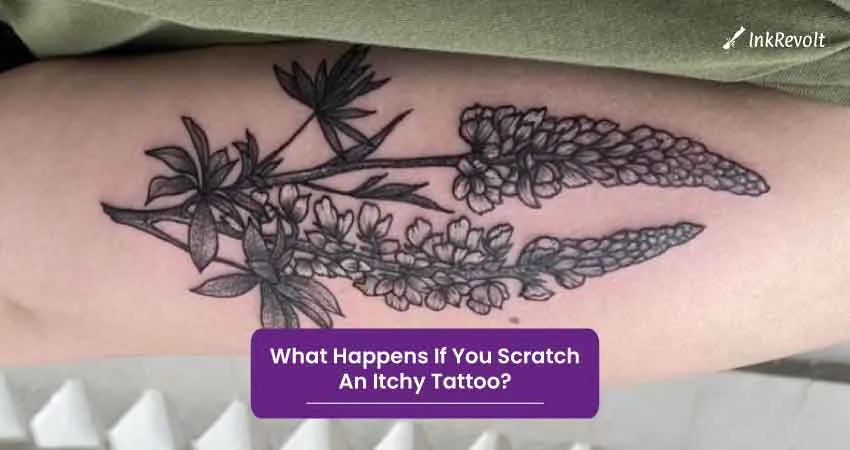
It’s tempting to scratch an itchy tattoo, but doing so might cause serious problems. Scratching an itchy tattoo might result in the following:
- Scratching the tattoo may cause harm to the healing skin and lengthen the time it takes to fully recover. Scarring, bleeding, and/or an irregular healing pattern are all possible outcomes.
- Scratching may introduce bacteria and other germs into healed skin, raising the risk of infection. Redness, swelling, warmth, leaking, and discomfort are just some of the symptoms that may occur as a result of this.
- Itching is made worse by scratching, which irritates the skin and sets off a chain reaction of immunological reactions that only makes things worse.
- The ultimate effect of the tattoo may be harmed if scratching causes substantial damage or infection. Because of this, the tattoo may end up looking splotchy, discolored, or uneven.
How To Stop A New Tattoo Itching
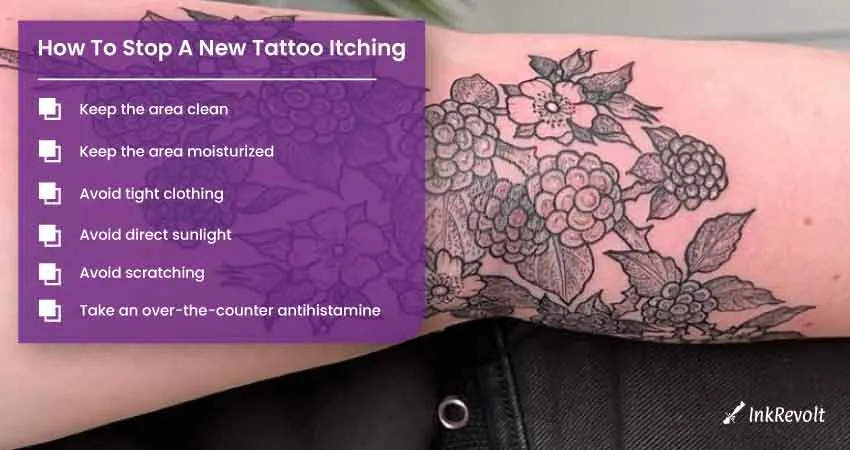
Fresh tattoos may be irritating, but there are various things you can do to relieve the irritation and encourage good healing. These are some ways to alleviate the itchiness of a fresh tattoo:
Keep the area clean
Hygiene plays a crucial role in the prevention of infections and the healthy recovery of a fresh tattoo. Mild soap and lukewarm water are ideal for gently cleaning the tattooed region. Rubbing or cleaning the tattoo too harshly might cause irritation and skin damage, so it’s best to be gentle.
Keep the area moisturized
When you first get a tattoo, the skin around it might feel dry and scratchy; moisturizing it can help. While moisturizing the tattoo, go for a fragrance-free lotion or ointment, since scents and other chemicals might irritate the skin. Moisturizer should be used many times daily to the tattooed region to prevent it from drying out.
Avoid tight clothing
Tight clothes may cause discomfort and itching by rubbing against the tattoo. Dress in lightweight, breathable fabrics like cotton and choose for loose fits. You should also stay away from bras and waistbands that are overly restrictive around the tattooed region.
Avoid direct sunlight
Keeping the tattoo covered or avoiding prolonged exposure to direct sunlight is recommended to prevent the tattoo from fading. Use a high-SPF sunscreen or cover the tattoo with clothes or a bandage if you must be in the sun.
Avoid scratching
A fresh tattoo may itch for a while, but scratching it will just harm the skin and slow the healing process. A quick slap or tap might help relieve the itch. An antihistamine like Benadryl, available without a prescription, may help relieve extreme itching.
Take an over-the-counter antihistamine
Use an antihistamine like Benadryl or another OTC medication if the itching becomes unbearable. Always check with your doctor if you have questions about your dose or side effects.
When Can I Scratch My Tattoo?
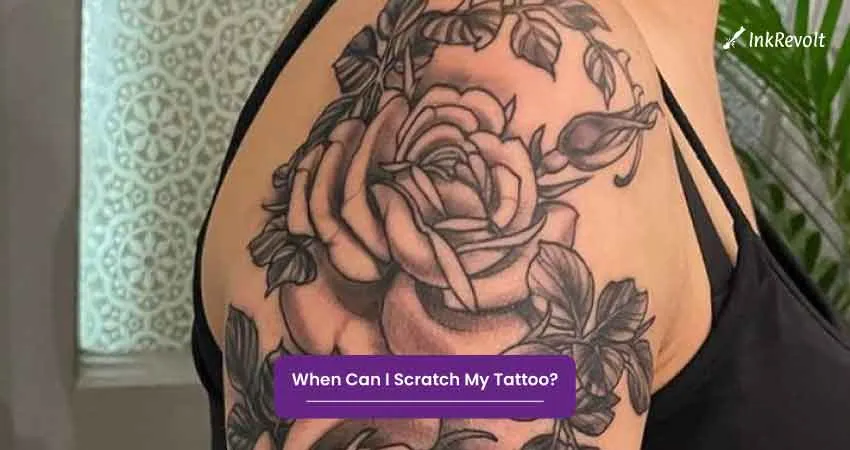
You must adhere to your tattoo artist’s specific aftercare recommendations, which might change based on factors including the tattoo’s size and placement. Wait at least two to three weeks for your tattoo’s skin to fully heal and the ink to settle before scratching it.
Tenderness, swelling, and itching are all common reactions to a new tattoo in the days after its application. Scratching or picking at the scabs or flakes that form can lead to the ink fading or becoming uneven, so it is best to be patient.
To alleviate the itch, try patting the affected region with a wet towel or applying a fragrance-free moisturizer.
Scratching your tattoo should be OK once the skin has fully healed and any scabs or flakes have naturally come off. Scratching or plucking at the tattooed region too much might harm the skin and the ink.
What Should I Avoid To Stop Itchy Tattoo?
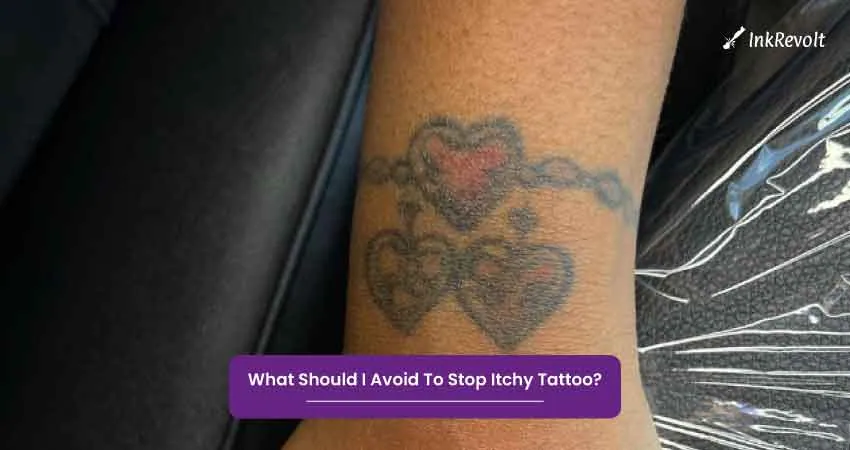
There are several things you should avoid doing if you want to stop your tattoo from itching. The following are some suggestions:
Do not scratch or pick at the tattoo
If you scratch or pick at the tattoo, you risk tearing the skin and getting an infection. In addition, it might harm the tattoo, making the ink seem uneven or fading.
Do not expose the tattoo to direct sunlight
In addition to making your tattoo more irritating, sunburn can hinder the skin’s ability to heal, which can delay the tattoo’s completion. Wear protective gear or apply a high-SPF sunscreen on the tattoo if you must be out in the sun.
Do not wear tight or restrictive clothing
Clothing that is too snug might irritate the tattoo by rubbing against it. Moreover, it might lead to an increase in perspiration, which in turn increases the risk of infection.
Do not use products that contain fragrances or other irritants
Always test a small area of your tattoo before applying anything with scents, colours, or other irritants. They can exacerbate itching and even induce allergic responses in some people.
Do not use hot water
Scratching becomes worse, and the ink fades, after bathing in hot water. To avoid damaging the ink, wash the tattoo with tepid water and wipe it dry carefully.
Avoiding these substances will help your tattoo heal more quickly and with less discomfort. Talk to your tattoo artist or a doctor if you’re worried about your ink.
Why Are Old Tattoos Itchy?
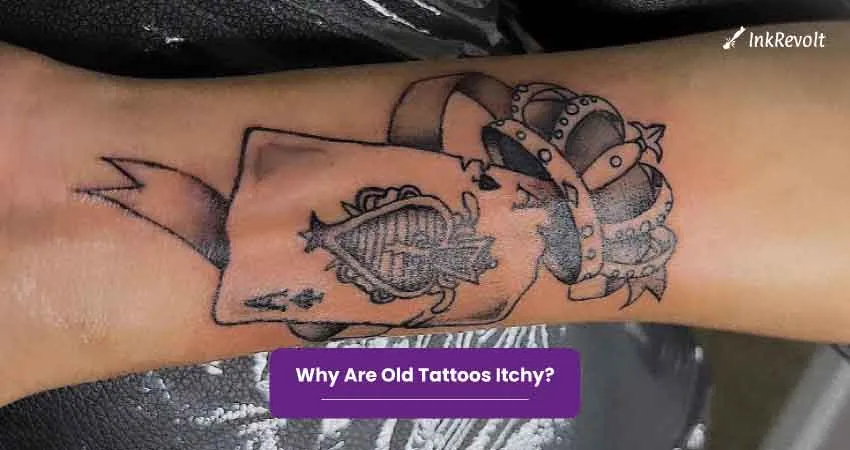
No matter how long you’ve had your tattoo, you’ve probably experienced some degree of itching. Some probable causes of sudden itching in an old tattoo include:
- Aged skin is drier than younger skin, which can make tattoos more irritating. This is especially the case if you have dry skin or if you live in a dry climate.
- The sun’s ultraviolet rays can make the skin itch more, and they can also dull the colour or definition of older tattoos. Using protective clothing or using sunscreen with a high sun protection factor (SPF) will help keep your tattoo from fading if you spend a lot of time outside.
- But, if you have a skin condition like eczema, psoriasis, or dermatitis, your tattoo may feel more irritating than usual. Inflammation, irritation, and dryness of the skin can all make tattoos more unpleasant.
- There is a small risk that a person will have an adverse response to the ink used in their tattoo. In some cases, medical treatment may be necessary to alleviate the resulting redness, itching, and inflammation of the skin.
Talk to your tattoo artist or a doctor if your previous tattoo is still itching after a long period of time. To alleviate your suffering, they can assist you in identifying the root cause of your condition and provide appropriate treatment options.
Frequently Asked Questions
Why is my tattoo starting to itch?
In response to the skin repairing itself after a needle prick, itching is a common symptom. The release of histamine is part of the immune system’s reaction to the tattoo, which causes the itchy sensation by warding off any infections that may exist.
If my tattoo starts to itch, should I be worried?
A: Infection or an allergic response might be to blame if the itching is followed by redness, swelling, or leaking. Talk to your doctor if the itchiness lasts more than a few weeks or if you have any other concerns about your health.
To what extent does a tattoo itch?
Depending on the size and placement of the tattoo, as well as the patient’s skin type and healing process, the itchy sensation may persist anywhere from a few days to several weeks.
Last Words
Itching after getting a tattoo is often an annoying and unpleasant side effect. Even though you may feel the want to pick or scratch at your tattoo, you should try to resist the impulse to avoid damaging your skin and the ink. Instead, consider wearing loose-fitting clothes and using fragrance-free moisturizers to calm the itch.
Talk to your doctor if you’re worried about your symptoms or if they last longer than a few weeks. With time and attention, your tattoo may heal beautifully and last a lifetime.
